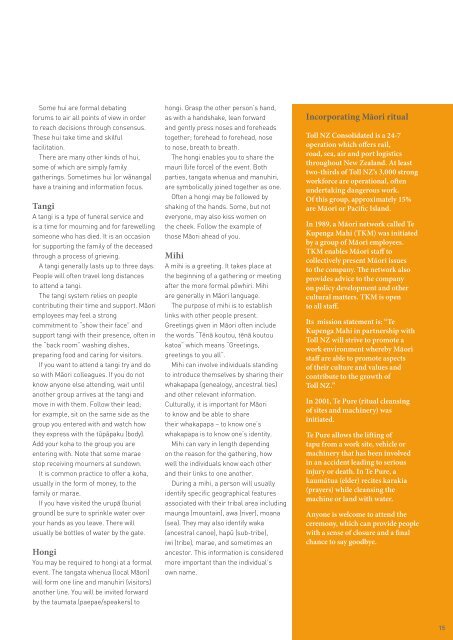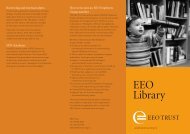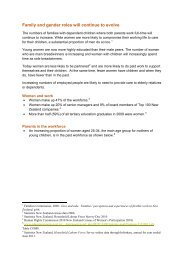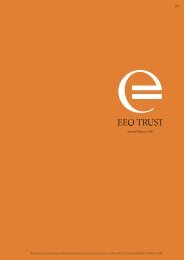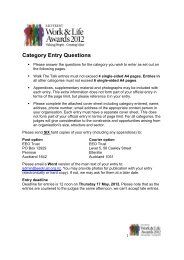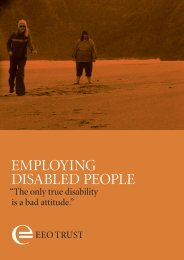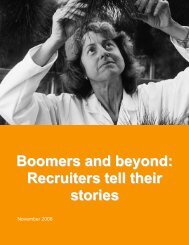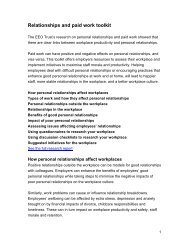Making a Difference - Equal Employment Opportunities Trust
Making a Difference - Equal Employment Opportunities Trust
Making a Difference - Equal Employment Opportunities Trust
- No tags were found...
You also want an ePaper? Increase the reach of your titles
YUMPU automatically turns print PDFs into web optimized ePapers that Google loves.
Some hui are formal debatingforums to air all points of view in orderto reach decisions through consensus.These hui take time and skilfulfacilitation.There are many other kinds of hui,some of which are simply familygatherings. Sometimes hui (or wānanga)have a training and information focus.TangiA tangi is a type of funeral service andis a time for mourning and for farewellingsomeone who has died. It is an occasionfor supporting the family of the deceasedthrough a process of grieving.A tangi generally lasts up to three days.People will often travel long distancesto attend a tangi.The tangi system relies on peoplecontributing their time and support. Māoriemployees may feel a strongcommitment to “show their face” andsupport tangi with their presence, often inthe “back room” washing dishes,preparing food and caring for visitors.If you want to attend a tangi try and doso with Māori colleagues. If you do notknow anyone else attending, wait untilanother group arrives at the tangi andmove in with them. Follow their lead;for example, sit on the same side as thegroup you entered with and watch howthey express with the tūpāpaku (body).Add your koha to the group you areentering with. Note that some maraestop receiving mourners at sundown.It is common practice to offer a koha,usually in the form of money, to thefamily or marae.If you have visited the urupā (burialground) be sure to sprinkle water overyour hands as you leave. There willusually be bottles of water by the gate.HongiYou may be required to hongi at a formalevent. The tangata whenua (local Māori)will form one line and manuhiri (visitors)another line. You will be invited forwardby the taumata (paepae/speakers) tohongi. Grasp the other person’s hand,as with a handshake, lean forwardand gently press noses and foreheadstogether; forehead to forehead, noseto nose, breath to breath.The hongi enables you to share themauri (life force) of the event. Bothparties, tangata whenua and manuhiri,are symbolically joined together as one.Often a hongi may be followed byshaking of the hands. Some, but noteveryone, may also kiss women onthe cheek. Follow the example ofthose Māori ahead of you.MihiA mihi is a greeting. It takes place atthe beginning of a gathering or meetingafter the more formal pōwhiri. Mihiare generally in Māori language.The purpose of mihi is to establishlinks with other people present.Greetings given in Māori often includethe words “Tēnā koutou, tēnā koutoukatoa” which means “Greetings,greetings to you all”.Mihi can involve individuals standingto introduce themselves by sharing theirwhakapapa (genealogy, ancestral ties)and other relevant information.Culturally, it is important for Māorito know and be able to sharetheir whakapapa – to know one’swhakapapa is to know one’s identity.Mihi can vary in length dependingon the reason for the gathering, howwell the individuals know each otherand their links to one another.During a mihi, a person will usuallyidentify specific geographical featuresassociated with their tribal area includingmaunga (mountain), awa (river), moana(sea). They may also identify waka(ancestral canoe), hapū (sub-tribe),iwi (tribe), marae, and sometimes anancestor. This information is consideredmore important than the individual’sown name.Incorporating Māori ritualToll NZ Consolidated is a 24-7operation which offers rail,road, sea, air and port logisticsthroughout New Zealand. At leasttwo-thirds of Toll NZ’s 3,000 strongworkforce are operational, oftenundertaking dangerous work.Of this group, approximately 15%are Māori or Pacific Island.In 1989, a Māori network called TeKupenga Mahi (TKM) was initiatedby a group of Māori employees.TKM enables Māori staff tocollectively present Māori issuesto the company. The network alsoprovides advice to the companyon policy development and othercultural matters. TKM is opento all staff.Its mission statement is: “TeKupenga Mahi in partnership withToll NZ will strive to promote awork environment whereby Māoristaff are able to promote aspectsof their culture and values andcontribute to the growth ofToll NZ.”In 2001, Te Pure (ritual cleansingof sites and machinery) wasinitiated.Te Pure allows the lifting oftapu from a work site, vehicle ormachinery that has been involvedin an accident leading to seriousinjury or death. In Te Pure, akaumātua (elder) recites karakia(prayers) while cleansing themachine or land with water.Anyone is welcome to attend theceremony, which can provide peoplewith a sense of closure and a finalchance to say goodbye.15


